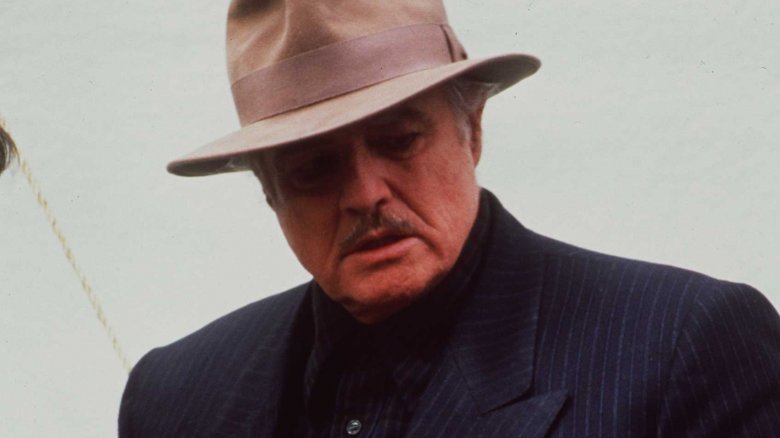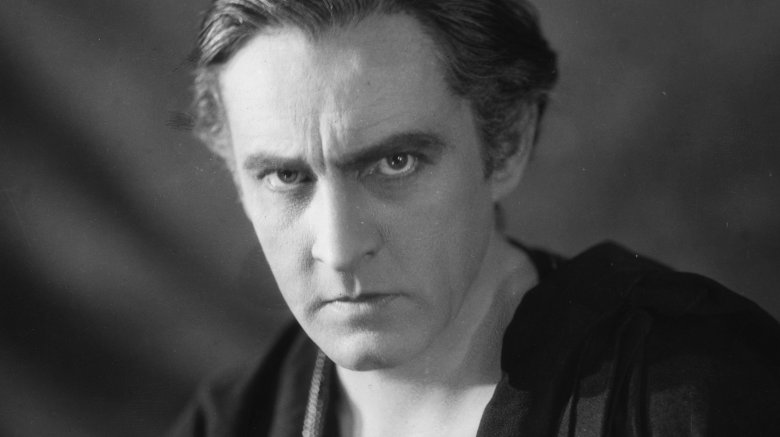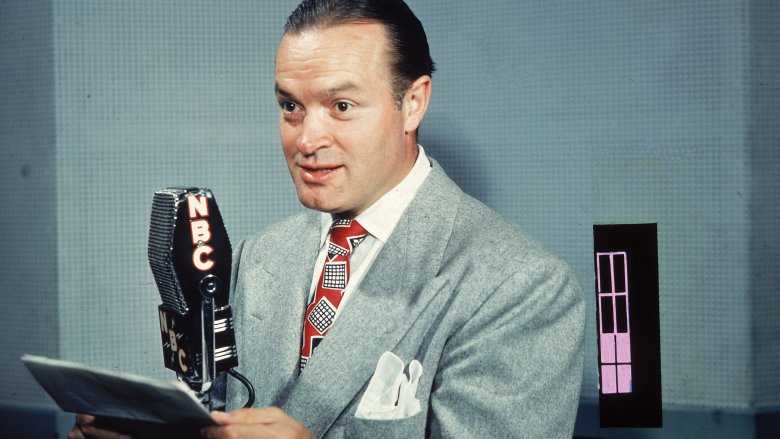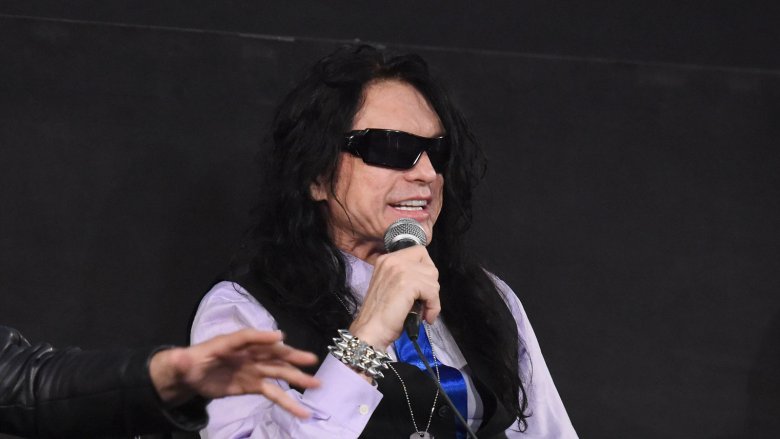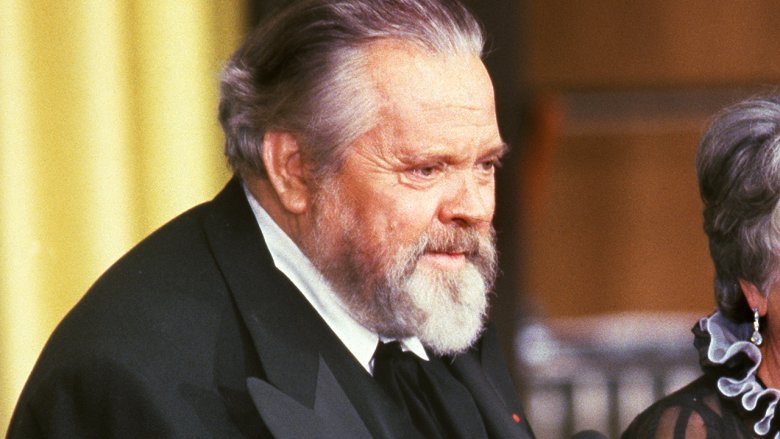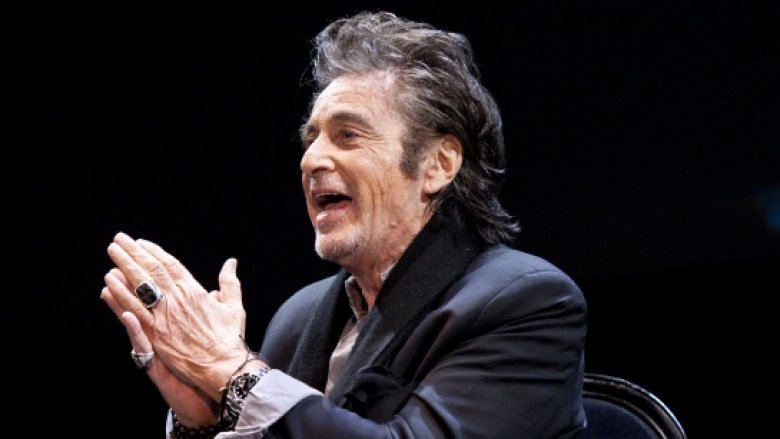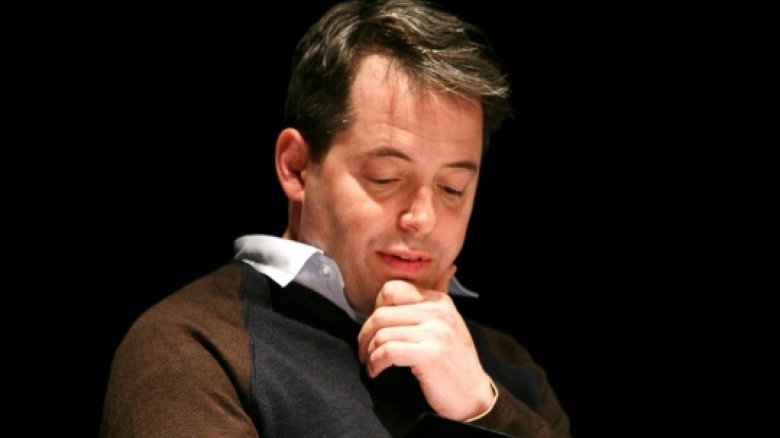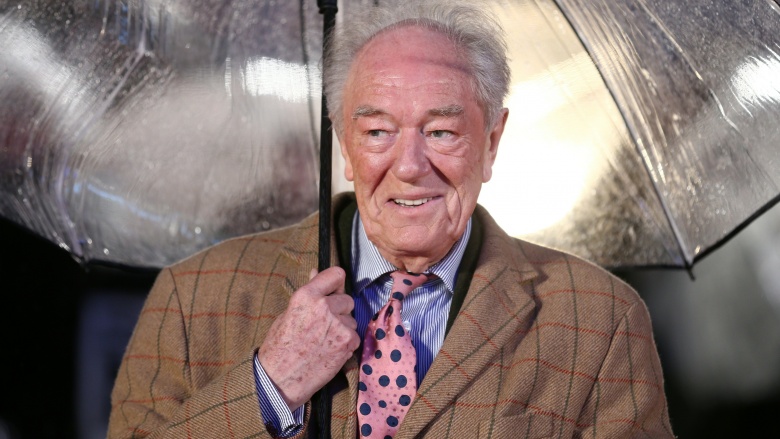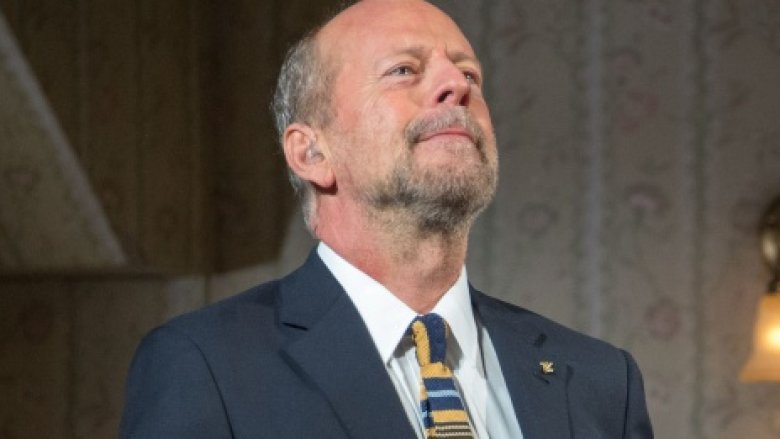Actors Who Couldn't Memorize Their Lines And Had To Cheat
Cheating in sports in universally frowned upon, but what about acting? Is it okay for an actor to cheat to get the job done? Apparently so, as there are plenty of film and theater superstars who can't be bothered to do the heavy lifting of learning their lines, so they just outright cheated their way through a successful take. While some actors arguably had a reasonable excuse for getting a little help, others weren't so guileless. Here are some actors who couldn't memorize their lines and had to cheat.
Tom Cruise
Since the script for 1990's "Top Gun"-meets-NASCAR blockbuster "Days of Thunder" was constantly being re-written, Tom Cruise had to cheat a little to get the job done during the film's many high-speed racing scenes. As Cole Trickle, an up-and-coming driver who we must remind you is named Cole Trickle, Cruise nearly killed himself by taping pages to the car's dashboard and trying to read and drive at the same time, leading to a crash that almost halted production for the day, according to an interview with Cruise in Rolling Stone.
So screenwriter Robert Towne, best known for penning "Chinatown," started feeding Cruise his lines through a "radio earphone" in his helmet. "So in the movie, when it looks like my crew chief is talking to me and I'm listening intently, I was actually waiting for my next line," said the shameless Cruise, destroying the magic of filmmaking for millions. Et tu, Trickle?
Marlon Brando
In 1996, Entertainment Weekly reported "expansive actor" Marlon Brando used an earpiece to help him remember his lines on the set of the legendarily troubled "The Island of Dr. Moreau." This was in May, a few months before the release of the film and the countless amazing stories from the set about its disastrous production, so the early news brief seems almost quaint — just a bit of inside baseball about a legendary actor phoning it in.
The story came from co-star David Thewlis, who claimed Brando would spout whatever was coming from the earpiece, even interference from a police radio, leading to Marlon Brando shouting non-sequiturs like "There's a robbery at Woolworths," a reference to the chain of Australian supermarkets. It's unlikely Brando actually shouted that line verbatim, and Thewlis probably just mentioned it for comedic effect. However, it's easy to believe that Brando totally cheated his way through his performance. After all, this is the same guy who insisted on having cue cards taped to the wall when filming "The Godfather," and even made his fellow actors hold cue cards for him, like poor Robert Duvall (via Huffpost). When asked why he wanted his lines printed out on cards, Brando reportedly said, "Because I can read them that way," reported Time. Hard to argue with that.
John Barrymore
The polite way to refer to famous drunks is to call them "legendary hellraisers." Well, John Barrymore must have raised more hells than Clive Barker himself because the early talkie star was the very definition of "drunk to the point of incapacity." Forget driving — Barrymore was so soused he was barely capable of remembering how to fall over. As movie blog Bright Lights Film reveals, by 1933 the one-time great was forced to use cue cards in nearly every film he did.
The cheating started when Barrymore spent an entire day trying to memorize dialogue for "Counsellor at Law," only to realize his remaining brain cells were too sodden to retain any information whatsoever. From that point on, he turned into a kind of cue card artiste, hiding cards all over the set so he could hit his lines. It was barely worth the effort. Watch any post-1933 Barrymore film, and you'll see a man who is both clearly drunk and clearly figuring out how to deliver a line as he's in the very process of delivering it. It would be funny if it weren't so unutterably tragic.
Bob Hope
It's bad enough to cheat with your dialogue on a movie set. It's a whole other level to do the same in your day-to-day life. Bob Hope was the guy who harnessed that inner laziness and transformed it into a lifestyle. As The New Yorker details, everything Hope ever said was dictated by cue cards. He would do TV gigs openly using cards, sometimes even reading jokes about how he had to rely on cue cards to remember his jokes. How very meta.
Hope's writers weren't just tasked with coming up with gags their boss could use on TV. Hope would take his cue cards with him even when he was out golfing, just to keep up a constant patter of jokes for his rich buddies. In an interview with the Baltimore Sun, Hope writer Fred Fox explained how Hope made him send back 20 jokes a day while Fox was on his honeymoon. You probably won't be surprised to learn Hope amassed 85,000 pages by the time he died, all of which he donated to the Library of Congress.
Hope's fondness for cue cards might be explained by his time performing for the troops in Vietnam (via the Los Angeles Times). The comedian was due to be at a Saigon hotel but was delayed by his cue card guy. Ten minutes after Hope had been scheduled to arrive, a gigantic bomb exploded, leaving 100 casualties. Hope claimed he was "saved by the idiot cards again."
The cast of SNL
The topical humor of "Saturday Night Live" is natural fodder for line-cheating, since memorizing 75 minutes of dialogue written that morning is a special kind of punishment. But SNL's rotating cast doesn't just rely on cue cards for gags or as memory prompts. Every single line is written down, including "Live from New York, it's Saturday Night!!!" And every single cue card is held by a guy named Wally Feresten, whom SNL's performers have been staring at for over 25 years.
The Los Angeles Times has Wally Feresten's story. In 1990, Wally wanted to get into writing for SNL. His brother, Spike Feresten — who would go on to write "Seinfeld's" Soup Nazi episode — managed to get Wally the cue card gig as a foot in the door. Rather than swinging wide open, Wally's foot got jammed there, leaving him as the guy holding cards for SNL for the next quarter of a century. In all that time, there's only been a single episode he hasn't worked on.
That means you can look back at any of the celebrities who've guested on SNL since 1990 and know for a fact they were staring at Wally as they delivered their gags. As for Wally, the experience of holding 75-plus cards for any given sketch, every single Saturday for decades has left him with chronic shoulder pain and tendinitis. It's a tough industry, huh?
Tommy Wiseau
Nobody will be surprised to hear Tommy Wiseau, the writer-director-producer-lead actor of legendary cackfest "The Room," struggled to learn his lines. Everything else about his "masterpiece" is so gloriously inept that hearing otherwise would be disappointing. But the story of just how difficult Wiseau found memorizing his own dialogue goes beyond what you might expect from the original disaster artist. According to co-star Greg Sestero, it took three hours, 32 takes, and the creation of a complex formula for Wiseau to nail seven seconds of talking.
The claims came in Sestero's book, "The Disaster Artist," and they're as surreal as anything else to do with "The Room." The scene in question is the "Oh, hi, Mark" moment, where Wiseau steps onto a roof, repeats over and over that he did not hit his future wife, then switches to perfect calm as he greets his bestie Mark. This was utterly beyond Wiseau. He would step out, look straight into camera, and forget his lines. He'd crack his head on the doorway then swear profusely. He'd explode at the crew. All over "oh, hi, Mark."
Eventually, Sestero was forced to come up with a kind of singsong formula to help Wiseau remember: "'I did not,' mad, mad, mad, throw the water bottle, stop, notice me, look up." That's more complex than the lines themselves. The results, uh, speak for themselves.
Johnny Depp
How far Johnny Depp's star has fallen. Just a few short years ago, he was still cinema's bad boy, still the alcoholic sea captain you secretly wanted to be. Several less-than-stellar "Pirates of the Caribbean" films and one spousal assault lawsuit later, and the star of "Edward Scissorhands" is starting to look a lot more like that creepy older guy your mom warned you not to date in high school. And now this. As part of a big, ugly lawsuit filed in 2017, Depp's managers claimed he couldn't even be bothered to learn his lines for movies, instead shelling out hundreds of thousands of dollars to have a sound engineer read his lines over an earpiece (via the BBC).
The juicy allegations were part of a legal case that had seen Depp sue his managers for treating his money like confetti and seen his managers counter-sue him for being such a real-life Jack Sparrow that he drank the entire collection of vintage wine he'd "invested" tens of thousands of dollars in. Their response: "Wine is not an investment if you drink it as soon as you buy it." (Rolling Stone reports he settled a year later.) Depp didn't deny the allegations, as per a 2018 interview with Rolling Stone. It would explain Depp's perma-confused expression in those "Pirates" movies, as he visibly thinks to himself, "They actually want me to say this garbage?"
Orson Welles
In the final days of his life, legendary actor-director-raconteur Orson Welles was asked to sit his ample frame down and record an introduction to an experimental episode of "Moonlighting," a whimsical Bruce Willis-Cybill Shepherd detective drama that was the closest thing the 1980s had to quality prime time television. No one realized it at the time, but it would turn out to be one of Welles' last-ever acting gigs. (He would make one more unscripted appearance on the "Merv Griffin Show.") The "Citizen Kane" director died just a few days after taping, which may explain his actions on set. Despite being an actor who had always loudly shunned cue cards, Welles wound up using them, writes Rich Little in "Little By Little: People I've Known and Been."
Pretty depressing, right? It's even more so when you watch the clip and realize how obvious it is that the elderly Welles is reading off cue cards and clearly trying his hardest to hold it together. At least he had the foresight to realize how past his prime he was. According to the Los Angeles Times, Welles personally requested Bob Hope's cue card guy hold the "Moonlighting" prompts up for him, presumably on the basis that if anyone could handle it, it was the person who'd been hefting around all 85,000 of Hope's cards for the past few decades.
Al Pacino
New York Post theater columnist Michael Riedel reported in 2015 about Al Pacino's epic struggle with memorization during previews for David Mamet's "China Doll" on Broadway. Pacino allegedly needed at least two teleprompters embedded behind columns on either side of the stage, and a third one behind an on-set couch. Riedel says Pacino also had his lines loaded up on prop laptops and used a weirdly-enormous-yet-character-appropriate Bluetooth earpiece as a back-up. This bit of high-tech tomfoolery backfired one night when interference caused Pacino, mid-scene, to say "There's static in this thing — I can't hear" and hand the earpiece to his co-star Christopher Denham, who broke character to go off-stage and get him a new one. Audience members paid $165 each, on average, to see this nonsense, reports Flavorwire.
The play's official opening night was mercifully pushed back by two weeks to allow the 75-year-old Pacino to get it together, prompting one of the show's producers to reassure the New York Times that yes, the legendary Oscar winner "has learned his lines." Marlon Brando's notorious hijinks aside, that's a bizarre thing to have to clarify regarding an actor of Pacino's caliber. It's like if Laurence Olivier got through "Hamlet" by taping a crib sheet to the back of Yorick's skull.
But even on opening night, critic Chris Jones with the Chicago Tribune said, "It is all too evident that the actor is struggling greatly to recall and impart his lines." Meanwhile, a nearby theater responded to the embarrassing brouhaha with a stinging note promising all actors would memorize most of their lines. Most!
Angela Lansbury
Why does the "Murder, She Wrote" lady sport Princess Leia-style hair buns over her ears in "Blithe Spirit"? It's not some bizarre Noël Coward/George Lucas crossover: Lansbury openly admits she used a concealed earpiece to help her stay on cue during her Tony-winning run in 2009. "It's not something you ever want to do, but if we're going to play important roles at our age, where our names are above the title on the marquee, we're going to ask for some support if we need it," the 84-year-old, unashamed Lansbury told the New York Times.
Lansbury almost pulled it off without a hitch, but there was reportedly one night where she jumped the gun and cut off her co-star Jayne Atkinson (via the New York Post). Waiting in the wings with fellow co-star Christine Ebersole the following night, Atkinson said, "I wonder if Angie will step on my laugh line again tonight." Ebersole's amazing response? "We'd better check with Houston." Ya burnt, Lansbury.
Matthew Broderick
America's sweetheart, Matthew Broderick, needed an "offstage helper" to get through the previews for Kenneth Lonergan's "Starry Messenger" on Broadway in 2009, to quote the New York Times. The former Ferris Bueller apparently took too many days off from studying his lines, something Broadway gossipmongers say he's notorious for (via The New York Daily News). The New York Daily News claims Broderick "flubbed 10 times in the first act alone" during the first preview for the play. One audience member claims Broderick "kept apologizing under his breath after he forgot a line, and everyone in the audience started to feel awkward." Ouch.
Life does, however, move pretty fast — Broderick soon stopped to look around and realize he was making an Ed Rooney-level fool of himself, and things got better. After opening night, The New Yorker raved, "The expert Broderick manages to make his character's timidity both charming and galling," which is likely how early audiences felt about the inexplicably boyish Broderick when he was freezing during previews.
Jessica Tandy and Hume Cronyn / Cicely Tyson and James Earl Jones
Donald Coburn's two-person, two-act "The Gin Game" is a notoriously difficult play to memorize, due to the constant chatter about playing cards that simply can't match the cards the actors are actually holding. Add to this the need for elderly actors, and it's a recipe for memorization cheats and shortcuts. During its 1977-1978 Broadway run, for example, husband-and-wife thespian duo Jessica Tandy and Hume Cronyn had to rely on notes, disguised as "player graffiti," on top of the card table to keep their lines straight, as per The New York Times. To avoid confusion, the faces of the playing cards were simply sanded off.
Fast-forward to 2015: Cicely Tyson and James Earl Jones, in a Broadway revival of "The Gin Game," decided to use earpieces for back-up, as per The Guardian, but considering how old they were at the time, it's impressive they even had the endurance to be "athletes of the heart," as Antonin Artaud said actors should strive to be. Tyson has been called "a master with the earpiece" by the New York Post, famously using the device not only for dialogue but for blocking, as well, during her Tony-winning run in "A Trip to Bountiful" in 2013. One night, however, her off-stage prompter, Wade, lost contact for a second, so the confused Tyson broke character and asked, "Wadie, Wadie — where are you?" It could be seen as tragicomic evidence the line between Tony and phony is perilously thin, but then again, she was 89. A crutch isn't a crutch if it's also your leg.
Michael Gambon
This one's pretty tragic, especially for "Harry Potter" fans: Dumbledore, aka Michael Gambon, gave up live theater in 2009 at age 69 during a production of Alan Bennett's play "The Habit of Art" because he simply couldn't memorize his lines anymore. The anxiety over it, in fact, landed him in the hospital. He tried to be a trooper and use an earpiece for about a month, but, tellingly, he found it an awful distraction.
Here's what he told the Sunday Times (via The Guardian): "After about an hour I thought, 'This can't work. You can't be in theatre, free on stage shouting and screaming and running around, with someone reading you your lines.'" Dumbledore has a point, right? Maybe Angela Lansbury and Cicely Tyson can make it work, but it's not exactly a normal or viable-for-all method for producing quality entertainment and/or art.
But then again, as Alexis Soloski with the Guardian asks: "Which would you rather see, an actor aided by prompting and arguably less engaged in the moment-to-momentness of the live event, or an actor struggling for a line?" It's a complicated question, but it's good to know Gambon realized he was cheating and stayed true to himself, even if it meant sacrificing doing something he loved.
Rita Ora
Unlike Marlon Brando and Al Pacino, British pop star-turned-actress Rita Ora gets a bit of a free pass for using an earpiece during the filming of "Fifty Shades of Grey" in 2015, since it was her first major film role. "I had to have someone in my ear on set telling me what to say before I said it because I was honestly, like, so nervous, I forgot everything that I had learnt," she told Access Hollywood (via Digital Spy), omitting the part about only having three lines in English in the entire film, one of which is "Uck, Seattle baseball" (via E Online).
Ora cited the "incredibly difficult" task of perfecting an American accent as one reason she couldn't learn her lines as Mia Grey, Christian Grey's sister, reported Cosmopolitan, including the two-syllable "She's here?" and the tongue-twisting "Oh my God, you exist." Her French accent during her one shade-throwing line about the Mariners is, however, excellent. Bon travail!
Bruce Willis
Sorry, "Die Hard" fans: Your boy Bruce Willis doesn't exactly have a stellar reputation as a genuine thespian. In 2015, his take on the James Caan role in the Broadway adaptation of Stephen King's "Misery" was met with uniformly negative reviews, mainly because it appeared Willis didn't bother to memorize his lines. Michael Riedel, for example, said he used "an earpiece the size of a cellphone circa 1984" to get through previews. His representatives admitted "an earpiece was used as a safety net," according to The Guardian. Did it get better, or did Willis die harder?
It was, sadly, the latter. After opening night, The New York Times said Willis had "the air of someone who would just as soon be taking a nap. In that sense, at least, it is quite easy to identify with him." Other reviews praised Laurie Metcalf's take on the Kathy Bates sledgehammer-wielding role but called Willis "inert" and "not especially like a man in mortal jeopardy," which isn't surprising considering, just weeks before, Riedel said Willis was living and dying by the earpiece: "Metcalf says a line and then there ... is ... a ... pause before Willis responds." Look, it's not Hollywood, but couldn't Bruno respect himself enough to at least memorize the lines?


